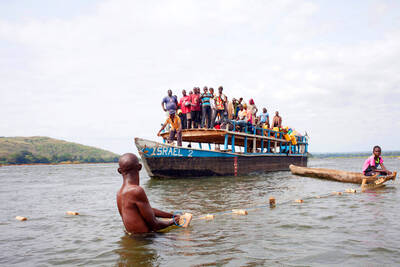Kosovo’s government yesterday accused neighboring Serbia of trying to destabilize the nation as ethnic Serbs blocked roads and conducted other incidents in the north apparently in a dispute over vehicle license plates and identity cards.
Officials in Kosovo had decided to resume the practice of requiring vehicles that enter from Serbia to replace Serbian license plates with Kosovar plates. The reverse is required by Serbia for vehicles from Kosovo that go to Serbia.
Kosovo is also planning to block its ethnic Serb minority from using only Serbian identity cards when crossing the border.
A Kosovar government statement said that many “aggressive acts” like road blocking and shooting in the northern areas dominated by ethnic Serbs were committed on Sunday and charged that they were incited by Serbia.
After discussions with European and US partners, the “reciprocity” license plate and identity card plan was being postponed for a month, until Sept. 1, the government said.
Kosovo was part of Serbia until an armed uprising in 1998-1999 by the territory’s ethnic Albanian majority triggered a bloody crackdown by Serbia.
A NATO bombing campaign to force Serbia’s troops out of Kosovo ended the war, but Serbia refuses to recognize Kosovo’s 2008 declaration of independence.
Kosovar Prime Minister Albin Kurti and President Vjosa Osmani blamed Serbian President Aleksandar Vucic for the protests.
“Vucic and [Petar] Petkovic are the main responsible persons for the riots,” Kurti wrote on Facebook.
Petkovic is Belgrade’s official in charge of Kosovo.
Osmani wrote on Facebook that “Vucic’s efforts to destabilize Kosovo” would fail.
Vucic responded by saying that “we’ve never been in a more complex situation than today,” and blamed Kosovo for the escalating tensions over the licenses plates and ID cards.
He accused Kosovo of trying to make itself into a victim and “taking advantage of the mood in the world where they think they can play cards,” he said, saying that Kurti is trying to be seen in the same light as Ukrainian President Volodymyr Zelenskiy.
Vukic said Kosovo cannot stop its ethnic Serbs from using Serbian identity cards when they cross the border.
The NATO-led peacekeeping mission in Kosovo said it was monitoring the “tense” situation in northern Kosovo and was “prepared to intervene if stability is jeopardized.”
The force said it would “take whatever measures are necessary to keep a safe and secure environment in Kosovo at all times, in line with its UN mandate.”
The mission has about 3,800 troops from 28 nations.

‘IN A DIFFERENT PLACE’: The envoy first visited Shanghai, where he attended a Chinese basketball playoff match, and is to meet top officials in Beijing tomorrow US Secretary of State Antony Blinken yesterday arrived in China on his second visit in a year as the US ramps up pressure on its rival over its support for Russia while also seeking to manage tensions with Beijing. The US diplomat tomorrow is to meet China’s top brass in Beijing, where he is also expected to plead for restraint as Taiwan inaugurates president-elect William Lai (賴清德), and to raise US concerns on Chinese trade practices. However, Blinken is also seeking to stabilize ties, with tensions between the world’s two largest economies easing since his previous visit in June last year. At the

UNSETTLING IMAGES: The scene took place in front of TV crews covering the Trump trial, with a CNN anchor calling it an ‘emotional and unbelievably disturbing moment’ A man who doused himself in an accelerant and set himself on fire outside the courthouse where former US president Donald Trump is on trial has died, police said yesterday. The New York City Police Department (NYPD) said the man was declared dead by staff at an area hospital. The man was in Collect Pond Park at about 1:30pm on Friday when he took out pamphlets espousing conspiracy theories, tossed them around, then doused himself in an accelerant and set himself on fire, officials and witnesses said. A large number of police officers were nearby when it happened. Some officers and bystanders rushed

Beijing is continuing to commit genocide and crimes against humanity against Uyghurs and other Muslim minorities in its western Xinjiang province, U.S. Secretary of State Antony Blinken said in a report published on Monday, ahead of his planned visit to China this week. The State Department’s annual human rights report, which documents abuses recorded all over the world during the previous calendar year, repeated language from previous years on the treatment of Muslims in Xinjiang, but the publication raises the issue ahead of delicate talks, including on the war in Ukraine and global trade, between the top U.S. diplomat and Chinese

RIVER TRAGEDY: Local fishers and residents helped rescue people after the vessel capsized, while motorbike taxis evacuated some of the injured At least 58 people going to a funeral died after their overloaded river boat capsized in the Central African Republic’s (CAR) capital, Bangui, the head of civil protection said on Saturday. “We were able to extract 58 lifeless bodies,” Thomas Djimasse told Radio Guira. “We don’t know the total number of people who are underwater. According to witnesses and videos on social media, the wooden boat was carrying more than 300 people — some standing and others perched on wooden structures — when it sank on the Mpoko River on Friday. The vessel was heading to the funeral of a village chief in